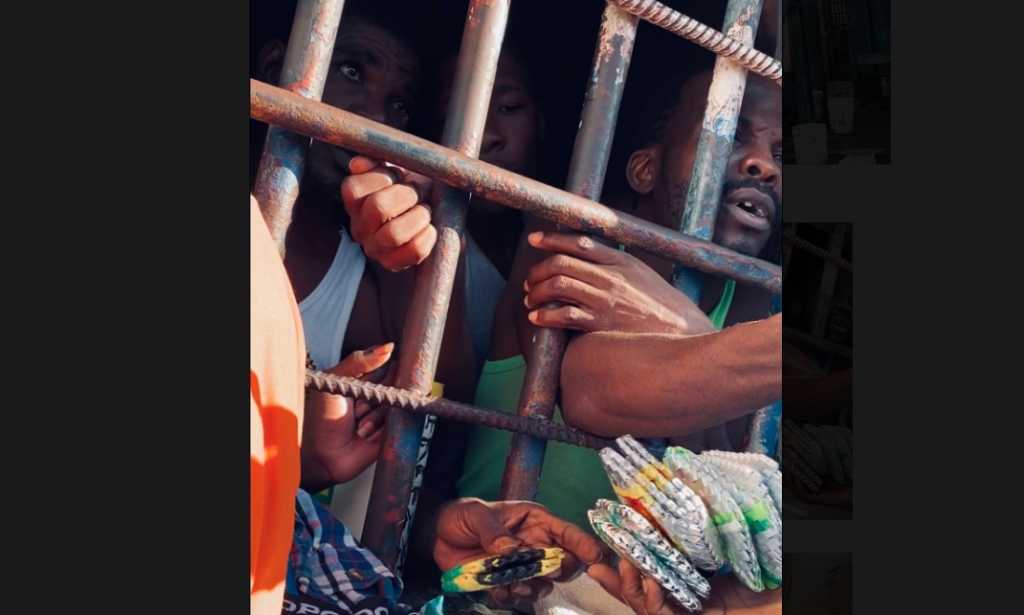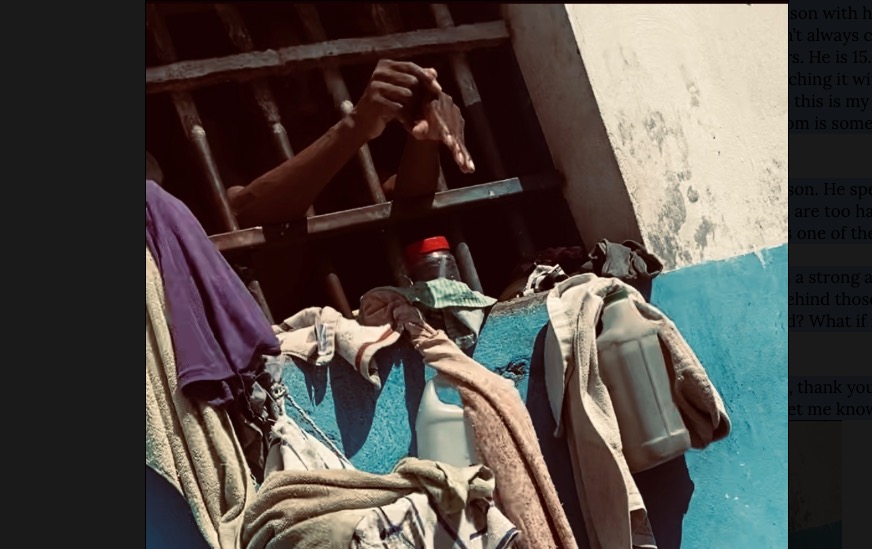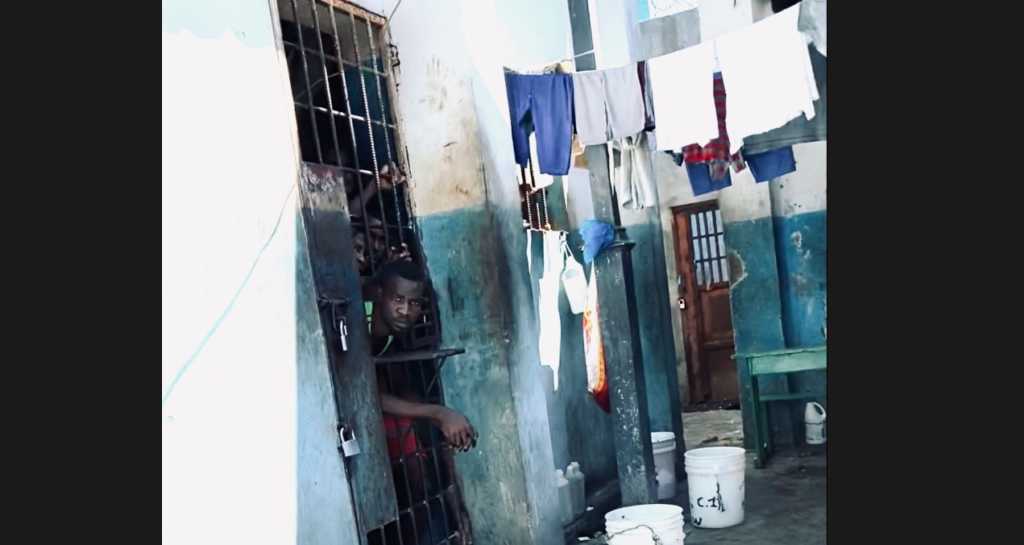A Christian missionary has revealed extremely inhumane living conditions for several hundred men imprisoned in Jérémie, Haiti.
Multiple tiny jail cells are crammed full with anywhere from 50-60 people who are forced to sleep on concrete while using only one bucket per room for a bathroom. Only those with family members who can send them food are able to eat with any regularity.
American missionary Kate Bartow, who Faithwire has interviewed previously for her daring exploits in the midst of intense persecution levied against white Americans, has family roots in Haiti and recently visited the prison in Jeremie for the first time.
Bartow managed to secretly take several images of the distressing scene, which depicts a level of desperation unthinkable to most humans around the globe.

Access to the facility is rare, evidenced by Bartow’s inability to have visited it until now. She has been to Haiti countless times and is a fixture in the small town but had still never been until just a few days ago.
Seeing the sad state of the conditions in the prison, it is no wonder authorities prefer to severely limit access. The sheer dire urgency expressed by the prisoners is beyond human imagination, as they beg for even the smallest of things — someone to talk to or read their note or accept the craft they’d made.

Bartow looked to have that thousand-yard stare soldiers often display when coming back from war. “I’ve seen a lot,” Bartow told me earlier today during an interview. “But this is the worst I’ve ever seen.”
She described the scene in vivid detail on her blog and in an interview with Faithwire.
“There are so many men packed into one cell that they can’t all go to sleep at the same time. Some are obligated to stand while others sleep and then they wake each other up and take turns. They sleep on the cement floor. There is one five-gallon bucket at the end of the room for all of them to go to the bathroom in. It is emptied in the morning and at night even though it is overflowing. The men lowest on the pecking order sleep near the bucket as feces and urine overflow onto the floor near their feet and heads. Men without families only eat what the prison feeds them. The “food” is worse than dog food. These men stand in these cells all day with hardly any airflow. They are hungry and thirsty and dirty. Their cheeks are sunken, and they have dark circles under their eyes. Their ribs and collar bones are prominent.”
The experience was clearly still fresh on her mind after returning to the states mere hours prior to this interview.
WATCH (or continue reading below):
She told of a teen boy she recognized in the prison. He was one of the street kids, who are so poverty-stricken they just hang around the streets all day hoping to pick up a few scraps of food or pennies. He’d been thrown in prison, at the age of 15, allegedly for street fighting.
But it’s hard to say, exactly, who really should be in prison and who shouldn’t. When asked about the justice system, Bartow simply responded “it’s Haiti. So, there isn’t one.”
Corruption runs rampant in every aspect of Haitian life. If you want someone in prison, you can probably pay to make that happen. It’s one of the main reasons the country cannot escape the grip of poverty, because it’d take a massive overhaul and rooting out of corruption that’s clearly not an easy task, or it would’ve been done already.
“You walk in, and there are these cells and they’re just packed in there,” Bartow explained. “It’s hot, there’s no ventilation, so they’re just standing there in their underwear because no wind is blowing in. What they’re being fed is worse than dog food… and they’re desperate.”

“You’re walking and arms and hands are reaching out. They’re pressing their faces against the bars to try and get your attention. They’re begging you for a phone call or just to talk to you. They gave me all these letters for me to read. Their stories. I got this pile of little notes scratched out on cigarette packs and little pieces of paper and wrappers, just saying what they need and what happened to them. They don’t know if I can do anything, but it was their only semblance of hope, that I had (their letter) in my hand. I said ‘I’m not God… I’ll do what I can.’ And they said ‘it doesn’t matter, just take it.'”
Bartow explained how she told the prisoners that despite the fact that some are indeed guilty, God values them just the same. “If we get real with ourselves, we’ve done, in our lifetimes, we’ve done a lot of things that if we were in Haiti, or the wrong person saw us — that could’ve been us (in prison).”
Bartow is now seeking to help those who are truly forgotten by society. Haiti is already a country suffering immensely, so those in prison suffer unimaginable amounts for a number of reasons, poverty and corruption being
“My goal is to provide the prisoners with one good meal a week. That’s pretty minimal. The eventual goal is finding 380 people who would give $2 a week and that would provide them with just one meal a week. I want to be selling their purses and wallets (that they make in prison),” Bartow explained. “That’s something that really moved me, that they were still creating. I feel when we stop creating is when we are completely hopeless. They’re still creating because they’re still grasping on to that hope.”
And despite the conditions, some trapped inside this hell-on-earth place still managed to look outside of themselves.
“Something that really moved me was as I was leaving, this guy got up and said “hey, I’m gonna pray for you,” Kate said, holding back tears. “That’ll get you.”
If you want to help, here’s Kate’s GoFundMe.
HELP NOW: Provide a meal for prisoners locked up with little to no food
No human being, no matter the crime, deserves to be in conditions such as these. Please to consider praying and contributing to the above GoFundMe to help someone get the basic dignity every human should have access to.
Bartow is inextricably tied to the small western town of Jérémie, as her family has been doing missions work there since she was a small child. Her father, Bryan Bartow, has been going to Haiti for missions work for even longer.
In January of 2017, Bartow found herself in the midst of some chaos as popular (yet controversial) politician Guy Philippe was extradited to America just days after his election to the Senate, which would’ve given him diplomatic immunity. He was facing charges of taking bribes from drug smugglers. Many Haitians took out their anger on any Americans in country, and Bartow was one of them. She was the only known American missionary who remained after authorities warned them to leave the country immediately.
Her strong faith guided her through the situation, eventually deciding to confront rioting gang members head on. After a bold middle of the night meeting, she convinced them to stop rioting and stop the violence. She’s now somewhat legendary in the small town, and walking around with her it’s easy to discern as much. Everyone seems to know and respect her.
You can watch Faithwire’s report on her story HERE.



